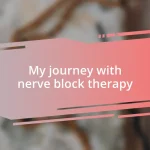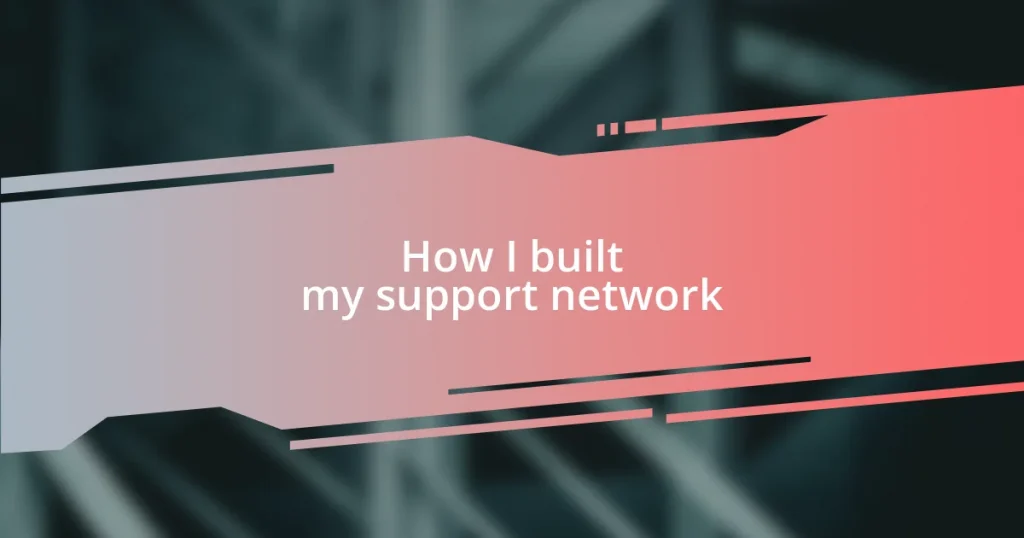Key takeaways:
- Identifying support needs through self-reflection and lists can clarify areas where help is needed, prompting meaningful conversations.
- Building a supportive network involves actively seeking connections through various avenues, including networking events, social media, and community groups.
- Nurturing relationships through consistent engagement, celebrating others’ achievements, and showing genuine interest strengthens bonds in both personal and professional contexts.
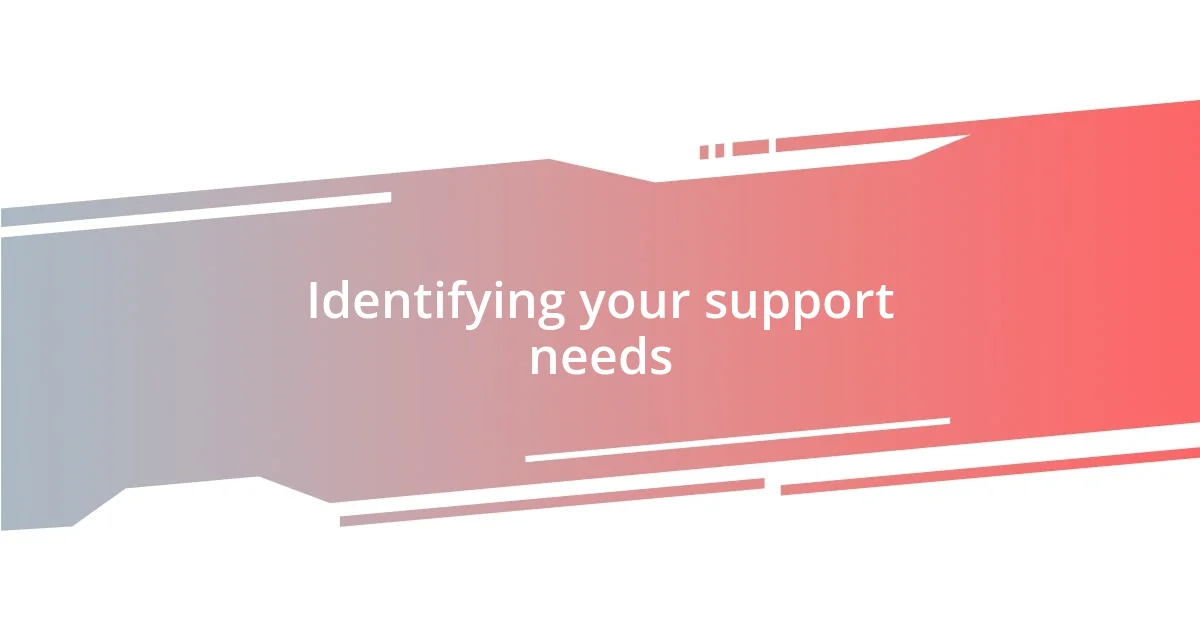
Identifying your support needs
Identifying your support needs often starts with self-reflection. I remember sitting alone one evening, feeling overwhelmed, and realizing I had not reached out for help in months. It was a lightbulb moment for me—what did I truly need to feel supported?
Sometimes, it helps to create a list of areas in your life where you feel unsure or unfulfilled. For example, I once wrote down “emotional support” and “career guidance,” which made it clearer for me to see where to find people who could fill those gaps. Doing this not only highlights your needs but can also lead to meaningful conversations with those who can help.
Have you ever thought about how your needs might change over time? I certainly have, as I frequently reassess my support system. It’s essential to acknowledge that what felt supportive yesterday may not suffice today; knowing this can empower you to seek out the right connections at each stage of your journey.

Finding potential support sources
As I navigated through the complexities of building my support network, I found that the first step was to identify individuals who could potentially serve as sources of support. I realized that support could come from various avenues, including friends, family, colleagues, or even community groups. One day, during a casual lunch with a coworker, I discovered she was facing similar challenges. That conversation opened my eyes to the value of tapping into relationships I already had and exploring new ones.
To help you in your search for potential support sources, consider the following approaches:
– Reflect on your relationships: Think about who you naturally turn to during tough times.
– Join local groups: Look for local community organizations or clubs that resonate with your interests.
– Utilize social media: Platforms like LinkedIn or Facebook can connect you with like-minded individuals who share your goals.
– Attend workshops or seminars: These spaces often foster networking and allow you to meet people who are also seeking support.
– Ask for referrals: Don’t hesitate to request recommendations from friends – they might know someone perfectly suited to help you.
By being open and proactive in these areas, I discovered a tapestry of support options that enriched my life in ways I hadn’t anticipated.
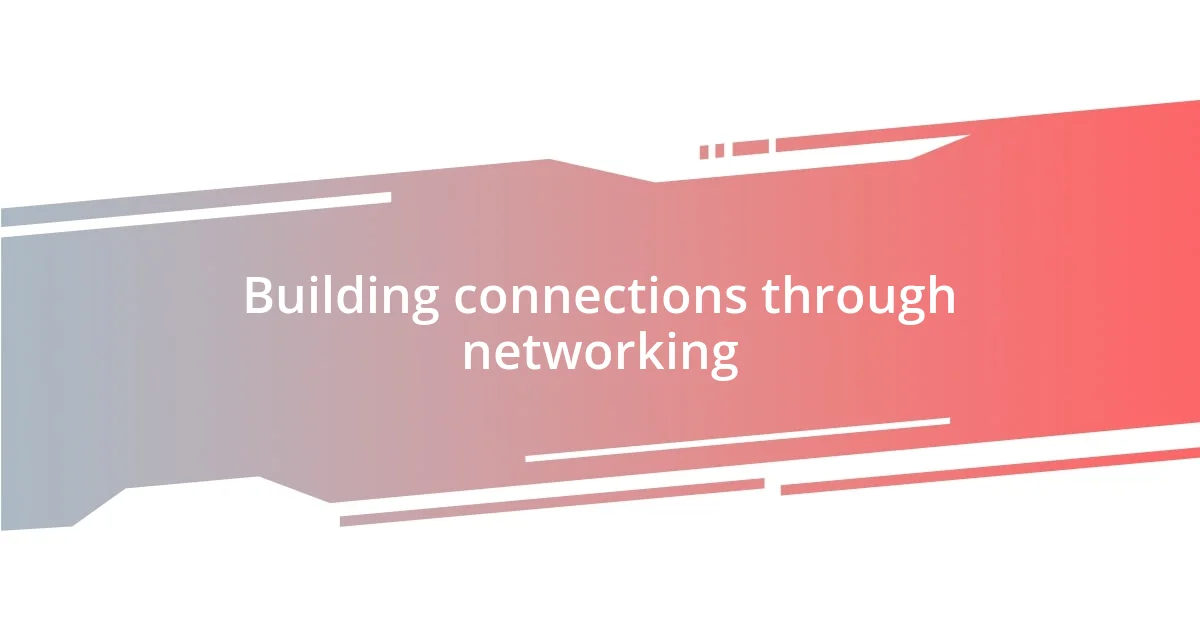
Building connections through networking
Building connections through networking can profoundly enhance your support network. I still remember my first networking event—nervous and hesitant, I walked into a room filled with strangers. It amazed me how quickly connections could be formed. By simply approaching someone and sharing a bit about myself, I found common ground that blossomed into meaningful relationships. Each conversation became a stepping stone, showing me that networking is not just about exchanging business cards but forming genuine bonds with others.
One evening, while attending a meetup for professionals in my field, I struck up a conversation with a seasoned mentor. We discussed our career journeys and the struggles we faced along the way. His insights were invaluable, and by the end of the night, I felt uplifted and inspired. It’s moments like these that remind me of the importance of being open to networking opportunities. Each encounter can lead to new perspectives, reminding me that building my support network isn’t just a task—it’s an adventure filled with learning and growth.
To deepen these connections, I started following up with individuals I met. A simple message saying, “I enjoyed our conversation!” goes a long way. It shows genuine interest in fostering that connection. Sometimes, it led to coffee meet-ups, where we could further explore each other’s experiences. Through these small gestures, I realized how effective networking can be in cultivating a supportive community that extends beyond professional boundaries.
| Networking Strategy | Description |
|---|---|
| Attend Events | Find opportunities to meet people in your field or interest area. |
| Utilize Social Media | Connect with others on platforms like LinkedIn to engage and share insights. |
| Follow Up | Reaching out post-event fosters deeper relationships. |
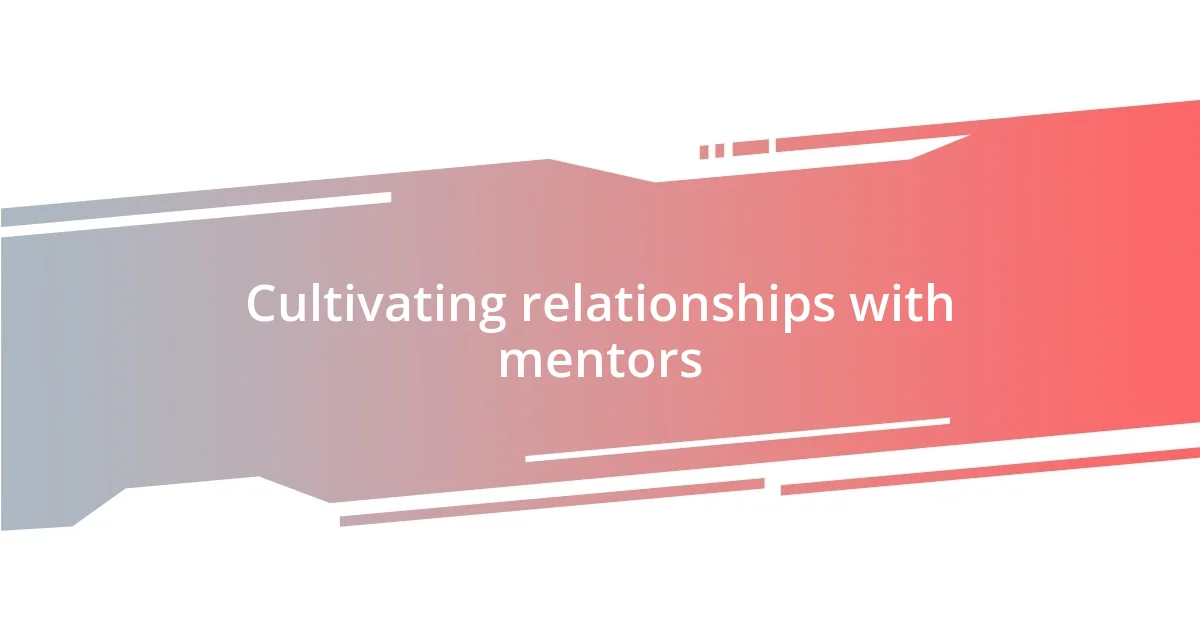
Cultivating relationships with mentors
Finding the right mentor can be transformative, and it all starts with being intentional. I remember reaching out to someone I admired, feeling a mix of excitement and nervousness. Would they even respond? To my surprise, they did! That initial exchange sparked a relationship that not only provided guidance but also fueled my passion for growth. It taught me that sometimes, taking the first step requires a leap of faith.
Cultivating a relationship with mentors isn’t just about their expertise; it’s also about building trust and rapport. I often asked questions that revealed their personal experiences—moments of vulnerability where they shared not just their successes, but also their setbacks. These conversations allowed me to see them as more than just teachers; they became allies in my journey. How many people miss out on wisdom because they don’t dive deep enough into the stories of others?
Moreover, I learned the importance of reciprocity in mentorship. It’s not a one-way street! I made it a point to share insights from my own experiences, even when I felt I had little to offer. Just showing appreciation for their time and feedback helped strengthen our bond. I genuinely believe that building a supportive network with mentors is a growing process—one where both sides contribute and learn, paving the way for mutual respect and lasting relationships.
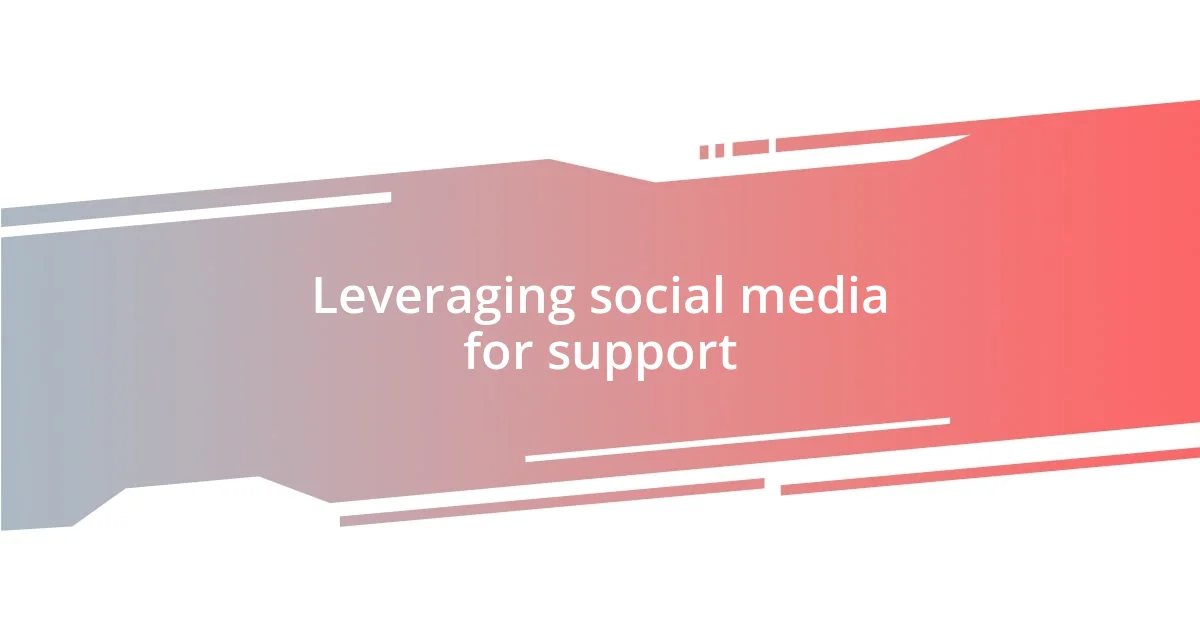
Leveraging social media for support
Social media has been a game-changer for me in building my support network. I remember the first time I tweeted about a challenge I was facing at work. To my surprise, several connections reached out with advice and encouragement. It was incredible to see how a simple post could draw in support from people I had never met face-to-face. Have you ever felt the power of a digital connection lifting your spirits?
As I delved deeper, platforms like LinkedIn became my go-to for not only professional engagement but also for emotional support. I started joining groups where others shared their struggles and successes. One day, I shared a post detailing a personal setback I’d faced in my career. The flood of supportive comments and stories from others who had experienced similar challenges was heartwarming. It reinforced my belief that vulnerability can foster authenticity and connection online. Don’t you find that sharing a bit of our own narratives invites others to do the same?
The beauty of leveraging social media lies in its accessibility. Unlike traditional networking events, where we may only meet a handful of people, I’ve cultivated relationships with countless individuals across the globe. By engaging in discussions, sharing resources, and even offering my insights, I turned digital acquaintances into a supportive community. When was the last time you reached out online for advice or shared a resource? Sometimes, stepping out of our comfort zones can lead to connections we never anticipated.
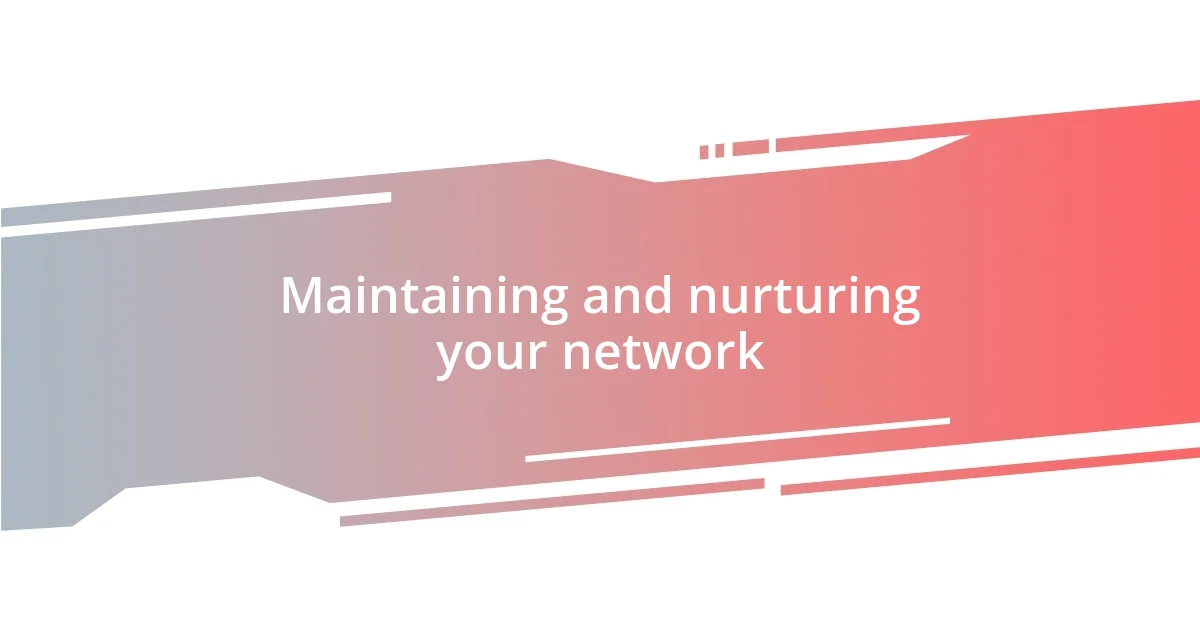
Maintaining and nurturing your network
Nurturing your network requires consistency and genuine interest. One of the practices I’ve adopted is scheduling regular check-ins with my contacts—sometimes it’s a quick message asking how they’re doing or sharing an article I found relevant to their work. Recently, I reached out to a former colleague to catch up, and we ended up discussing both our personal and career journeys. That simple gesture not only rekindled our relationship but also provided insights that I hadn’t considered before. Have you thought about how a small gesture can deepen a connection?
Investing time in your network is essential. I often dedicate a few hours each month to attend virtual meetups or workshops where I can not only learn but also reconnect with familiar faces. These events remind me of the shared experiences we all carry and the unique perspectives we bring to the table. I still vividly recall the last workshop I attended; as I listened to others share their challenges, it struck me how our collective learning can bolster individual growth. When was the last time you gathered insights from your community?
Moreover, I’ve realized that celebrating others’ achievements is a vital part of nurturing relationships. Whether it’s sending a congratulatory message for a new job or publicly acknowledging someone’s success on social media, showing that you care about their journey fosters goodwill. One time, I organized a small online celebration for a friend’s milestone, and it strengthened our bond. It’s remarkable how creating moments of joy can transcend the usual networking interactions. What small steps can you take to uplift those around you?








